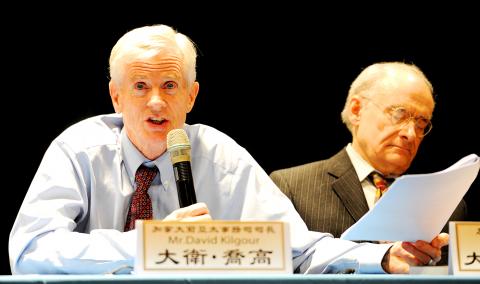Despite economic growth, the condition of human rights in China is still very bad — especially when it comes to the persecution of religious and minority groups by the Chinese Communist Party (CCP) — participants at a conference on human rights in China said yesterday, calling on Taiwanese to pay more attention to human rights issues in China.
“Taiwanese are not paying enough attention to issues related to human rights and democracy in China, and I think the first thing we can do to help China democratize is show more concern,” said Maysing Yang (楊黃美幸), deputy executive director of Taiwan Foundation for Democracy, a sponsor of the conference organized by the Association for Free Communication.
A large number of people might not care much about human rights in China because of China’s hostility to Taiwan, she said, “but we should be opposed to the authoritarian regime, not the people.”

Photo: Lo Pei-der, Taipei Times
China’s democratization would be beneficial to Taiwan’s national interests, Yang said.
“Pressure from the outside would actually work,” Yang said. “For instance, the conditional release of [Chinese dissident] Ai Weiwei (艾未未) was the result of international pressure.”
Among the different forms of human rights violations, David Matas, Canada-based human rights attorney and co-author of Report into Allegations of Organ Harvesting of Falun Gong Practitioners in China, said that live organ harvesting of Falun Gong practitioners in China was probably the most horrible and the hardest to investigate.
“There are no bodies of victims [in live organ harvesting], because when they are dead, their bodies are cremated; there are no witnesses, because there are only the perpetrators and the victims; there are no crime scenes, because it usually takes place in operation rooms or mobile vehicles that are cleaned right away,” Matas said, adding that organs harvested from Falun Gong practitioners are usually sold at high prices to people awaiting organ transplants in China or abroad.
Falun Gong practitioners are chosen as victims of live organ harvesting because Falun Gong is a banned movement in China, Matas said.
Another co-author of the book, David Kilgour, who is also a former member of the Canadian parliament, said that more than two-thirds of torture victims in China are Falun Gong practitioners, while the group also made up about 50 percent of the detainees at labor camps.
Persecution of religions groups does not stop with Falun Gong, Kilgour said, “Tibetan Buddhists, Muslims and Christians are often victims as well.”
Yang Hsien-hung (楊憲宏), a political commentator and chairman of the Taiwan Association for China’s Human Rights, agreed with Kilgour.
He said he was stunned when he attended a sermon by a Chinese Christian group that visited Taiwan.
In stead of urging his followers to follow God’s lead, Yang said, the preacher “urged Chinese Christians to follow the guidance of the CCP.”

Chinese Nationalist Party (KMT) Chairman Eric Chu (朱立倫), spokeswoman Yang Chih-yu (楊智伃) and Legislator Hsieh Lung-chieh (謝龍介) would be summoned by police for questioning for leading an illegal assembly on Thursday evening last week, Minister of the Interior Liu Shyh-fang (劉世芳) said today. The three KMT officials led an assembly outside the Taipei City Prosecutors’ Office, a restricted area where public assembly is not allowed, protesting the questioning of several KMT staff and searches of KMT headquarters and offices in a recall petition forgery case. Chu, Yang and Hsieh are all suspected of contravening the Assembly and Parade Act (集會遊行法) by holding

PRAISE: Japanese visitor Takashi Kubota said the Taiwanese temple architecture images showcased in the AI Art Gallery were the most impressive displays he saw Taiwan does not have an official pavilion at the World Expo in Osaka, Japan, because of its diplomatic predicament, but the government-backed Tech World pavilion is drawing interest with its unique recreations of works by Taiwanese artists. The pavilion features an artificial intelligence (AI)-based art gallery showcasing works of famous Taiwanese artists from the Japanese colonial period using innovative technologies. Among its main simulated displays are Eastern gouache paintings by Chen Chin (陳進), Lin Yu-shan (林玉山) and Kuo Hsueh-hu (郭雪湖), who were the three young Taiwanese painters selected for the East Asian Painting exhibition in 1927. Gouache is a water-based

Taiwan would welcome the return of Honduras as a diplomatic ally if its next president decides to make such a move, Minister of Foreign Affairs Lin Chia-lung (林佳龍) said yesterday. “Of course, we would welcome Honduras if they want to restore diplomatic ties with Taiwan after their elections,” Lin said at a meeting of the legislature’s Foreign Affairs and National Defense Committee, when asked to comment on statements made by two of the three Honduran presidential candidates during the presidential campaign in the Central American country. Taiwan is paying close attention to the region as a whole in the wake of a

OFF-TARGET: More than 30,000 participants were expected to take part in the Games next month, but only 6,550 foreign and 19,400 Taiwanese athletes have registered Taipei city councilors yesterday blasted the organizers of next month’s World Masters Games over sudden timetable and venue changes, which they said have caused thousands of participants to back out of the international sporting event, among other organizational issues. They also cited visa delays and political interference by China as reasons many foreign athletes are requesting refunds for the event, to be held from May 17 to 30. Jointly organized by the Taipei and New Taipei City governments, the games have been rocked by numerous controversies since preparations began in 2020. Taipei City Councilor Lin Yen-feng (林延鳳) said yesterday that new measures by